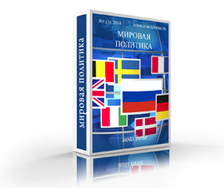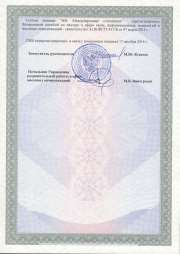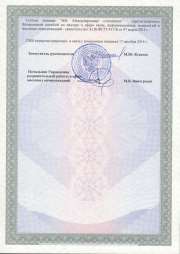MAIN PAGE
> Back to contents
Publications of Grachev Bogdan
|
Grachev B. - Russia's Civilizational Choice: the Eurasian Alternative
|
|
pp. 38-52
|
DOI: 10.25136/2409-7144.2022.8.36899
Abstract: The purpose of this work is an attempt to determine the role of the Eurasian factor in the civilizational choice of Russia. This scientific problem is considered by the author in two sections: philosophical-historical, involving an appeal to the ideological heritage of the Eurasians, and philosophical-political, allowing to assess the significance and prospects of the Eurasian vector as one of the key directions of Russia's foreign policy. The article defines the relevance of Eurasian integration for Russia, provides the provisions of the Eurasians that support the integration process. The prospects of Russia's Eurasian civilizational choice are examined both from a cultural and historical point of view and from the perspective of current geopolitical realities. The collapse of the Soviet Union is assessed as a natural stage of historical development necessary for liberation from the borrowed communist idea and for the formation of a pyramidal identity structure that requires the actualization of the national identity of peoples. One of the elements of this structure is a "supranational" identity, the formation of which is possible within the framework of the implementation of the Eurasian project. The consequence of the implementation of such a project may be the satisfaction of the public need for a new consolidating national idea, as well as the satisfaction of the demand for great power inherent in Eurasian psychology. In conclusion, it is concluded that the formation of the Eurasian Union is necessary from the point of view of national security in conditions of shifting the line of the civilizational fault to the borders of Russia.

|
Philosophical Thought, 2021-11
|
|
Grachev B. - Philosophical-political comprehension of Eurasia in the context of the Russian project of civilizational development
|
|
pp. 119-138
|
DOI: 10.25136/2409-8728.2021.11.36833
Abstract: This article attempts to “objectify” and conceptualize the concept of “Eurasia”, determine its ontological characteristics as the sociopolitical space of development of the Russian civilizational project, as well as delineates the contours of this space within the framework of a project-constructive methodological orientation. The author refers to the history of formation of holistic representations on Eurasia within the scientific thought, giving special attention to the contribution of geopoliticians, and emphasizing the implementation of theoretical provisions in real politics. The empirical basis relies on the two megaprojects that are implemented in practice: the Silk Road Economic Belt initiated by China and the Eurasian Economic Union (which includes Armenia, Belarus, Kyrgyzstan, Kazakhstan, and Russia), as well as the “Greater Eurasia” as a potential way of their interlink and development of the space for cross-civilizational dialogue on the continent. The main conclusions are as follows: 1) Eurasia is determined both as the goal of the Russian project of civilizational development and as the space it can be realized within. At the same time, the space for the development of Russia-Eurasia is described as the natural environment of the Russian civilizational project, the space of the “primary circle”. Special role is played by the creation and development of the Eurasian Economic Union, which unites the countries that have faced the escalation of nationalist sentiment after the dissolution of the Soviet Union; 2) The “Greater Eurasia” is designated as the “secondary circle” of the Russian civilizational project, a space for continental cooperation, determines by new political reality. 3) Certain zones of civilizational confrontation and contradictions on the continent have been identified. The author believes that the need for conceptualization of the concept at hand lies in the significant sociopolitical formative potential.

|
Politics and Society, 2021-4
|
|
Grachev B. - Civilizational factor in state-building process of the founding countries of the Eurasian Economic Union
|
|
pp. 44-53
|
DOI: 10.7256/2454-0684.2021.4.31473
Abstract: The subject of this research is the civilizational foundations of the political systems of the founding countries of the Eurasian Economic Union, their genesis, and manifestation at various historical stages. Particular attention is turned to outlining the cultural-civilizational characteristics that determined the similarity of the political tradition. The article explores the peculiarity of transition from the Soviet political system to national political systems, indicates the differences in the process of establishment of the national political systems, reveals the general characteristics of the results of such transit, defines the role of cultural-civilizational factors. Assessment is given to the influence of geopolitical and civilizational factors upon integration and its further course. Research methodology leans on the historical-politological analysis applied through the prism of cultural-civilizational theory, as well as a range of the methods of historical-descriptive approach. The author's special contribution consists in summarizing the civilizational experience of founding countries of the Eurasian Economic Union from the perspective of its importance for the integration process. In the conditions of the demand for nationalism and sovereignty, the strong state power becomes one of the key obstacles towards further integration. Long-terms success of the union requires the formation of a certain ideological framework, such as variations of neo-Eurasianism.

|
Philosophical Thought, 2020-11
|
|
Grachev B. - Eurasian Economic Union is an international organization or multidimensional institution. Ontological discrepancies and political consequences
|
|
pp. 45-54
|
DOI: 10.25136/2409-8728.2020.11.34309
Abstract: The subject of this research is the ontological nature of the Eurasian Economic Union (EAEU). An attempt is made to determine the conceptual philosophical-political characteristics of this organization in the light of particular and universalistic approaches. The author examines and describes the impact of ontological characteristic upon the process of formation and functionality of the international organization and multilateral institution. In future, the dual nature of EAEU can carry political and practical consequences for the Eurasian integration – the question of expectations and outcome from its participation in the indicated integration project, degree and nature of influence upon the domestic policy of EAEU member-states may arise sooner or later. The author's special contribution consists in formulation of the problem of long-term existence of the Eurasian Economic Union from perspective of identification of its ontological characteristics. For achieving success in this regard, integration must represent a universalistic paradigm founded on the principle of pan-unity (universality), when any integration structure is a part of infinite whole, the Universe, endued with the basic characteristics and patterns, and interconnected with all other parts. However, if integration wends the path of particularism, it would be founded on the positivistic methodology, which in turn, considers “external realities” and their structures as measurable. Each participant of the integration would seek to comply with the own national interest, which first and foremost is aimed at preservation of national sovereignty. In this regard, the term “international organization” no longer reflects the nature of such integration structure to the fullest, and thus it can be referred to as “multilateral institution”.

|
Conflict Studies / nota bene, 2020-4
|
|
Grachev B. - Sustainability of political systems of EAEU member-states and the crises of 2020. Part 1. Belarus.
|
|
pp. 19-40
|
DOI: 10.7256/2454-0617.2020.4.34302
Abstract: The object of this research is the political system of the Republic of Belarus viewed in the context of sociopolitical conflict instigated by the results of presidential election of 2020. The Eurasian Economic Union faced a number of severe internal problems: besides the protests in Belarus, the parliamentary elections in Kyrgyzstan led to resignation of the incumbent president, and the Nagorno-Karabakh conflict has escalated. Therefore, special attention is given to examination of the factors of sustainability of the political system their significance for Eurasian integration and Russia-Belarus bilateral relations. The authors assesses the consequences of the manifestations of crisis, and analyzes the mechanisms of resilience of the political system to the internal challenges. The history of establishment of the modern structure of political system of Belarus is analyzed. The formal institutional and factual functional relations are revealed. The author’s special contribution lies in the assessment of factors of sustainability of the political system of Belarus. Understanding of sustainability of political systems of regional nations is the cornerstone in risk assessment caused by integration and forecasting of the development of international relations in the region. The political system of Belarus, which has been formed throughout 26 years of presidency of A. G. Lukashenko, is currently (and so far successfully) being stress tested. The built vertical of executive power allowed to “amortize” the colossal level of tension emerged in the society after the announcement of voting results. It is determined that the consequences of crisis in Belarus are overall positive for Russia and EAEU. However, the risks of further destabilization of the political system and regime change pose a serious threat for the development of integration project.

|
Conflict Studies / nota bene, 2019-3
|
|
Grachev B. - The conflicts of civilizational projects in the territory of Near East
|
|
pp. 45-56
|
DOI: 10.7256/2454-0617.2019.3.31101
Abstract: The subject of this research is the Near East as a conflictogenic territory – the region that reveals confrontation with the Western civilization, as well as having a cascade of internal contradictions. The author explores the attempts of establishing the Western democratic structure in the countries of the region, and analyzes the results of such attempts. Particular attention is dedicated to determination of civilizational characteristics of the regions and their manifestations in political process and historical retrospective. The article provides examples demonstrating the emergence of the unique models of sociopolitical order as a response to political and economic influence of the West. The author considers the experience of Iran, Libya and Tunis, analyzes the positions of terrorist organizations, and gives assessment for the prospects of creation of Caliphate. The author’s special contribution consists in description of response of a number of Near East countries to the cultural and economic expansion of the West, taking into account a difficult and mosaic from the civilizational and political perspectives public method of its organization. The research reflects the evolution of ideological grounds of the unity of Near East countries, as well as reviews the strong and weak aspects of the various social models emerging in the region.

|
Law and Politics, 2018-11
|
|
Grachev B. - The problem of determining the structure of a political system within integration bloc
|
|
pp. 23-30
|
DOI: 10.7256/2454-0706.2018.11.28009
Abstract: The object of this research is the integration bloc at the stage of the Customs Union and higher levels. The subject of this research is the political system of such union as a new type of political organization of the society. The focus of attention is the problem of determining the presence of political system within integration blocs. The author gives a conceptual insight into the nature of such political system, the process of their origination and development, as well what role is played by political actors in this process. An attempt is made to structuralize the system under consideration, as well as describe its key levels. The author examines the peculiarities of development of the political process. The accomplishments of Gabriel Almond’s structural-functional approach and David Easton’s systemic approach underlie the methodological foundation of this work. The political system of integration bloc is considered through the categories “entrance – exit – feedback”; the particular provisions of the theory of multilevel governance are applied. The author’s main contribution lies in identification of the key distinctions between the national and supranational political systems, determination and description of the levels of the latter, as well as exposition of the mechanism of political process. The acquired results advance the methodology of integrative research and comparative approach in political science overall, allowing to conduct the analysis of sustainability of political objects of supranational level, as well as the backbone for political forecasting.

|
Law and Politics, 2018-11
|
|
Grachev B. - The problem of determining the structure of a political system within integration bloc
|
|
pp. 23-30
|
DOI: 10.7256/2454-0706.2018.11.43197
Abstract: The object of this research is the integration bloc at the stage of the Customs Union and higher levels. The subject of this research is the political system of such union as a new type of political organization of the society. The focus of attention is the problem of determining the presence of political system within integration blocs. The author gives a conceptual insight into the nature of such political system, the process of their origination and development, as well what role is played by political actors in this process. An attempt is made to structuralize the system under consideration, as well as describe its key levels. The author examines the peculiarities of development of the political process. The accomplishments of Gabriel Almond’s structural-functional approach and David Easton’s systemic approach underlie the methodological foundation of this work. The political system of integration bloc is considered through the categories “entrance – exit – feedback”; the particular provisions of the theory of multilevel governance are applied. The author’s main contribution lies in identification of the key distinctions between the national and supranational political systems, determination and description of the levels of the latter, as well as exposition of the mechanism of political process. The acquired results advance the methodology of integrative research and comparative approach in political science overall, allowing to conduct the analysis of sustainability of political objects of supranational level, as well as the backbone for political forecasting.

|
Grachev B. - Stability factors of integration associations
|
|
pp. 62-69
|
DOI: 10.7256/2409-7543.2017.2.21683
Abstract: The paper reveals the factors determining the existence and functioning of an integration association, which is considered as a political system. The research subject is the political system of an integration association. The author considers the issues of the integration theory and detects fundamental characteristics of such a type of international political objects as economic integration associations. The paper characterizes the research methodology and contains a brief description of functional elements of the political system of a state and the ways of their interaction. The author analyzes and systematizes the factors determining the existence of an integration association. The research methodology is based on the key provisions of the structural-functional analysis of Gabriel Almond, the elements of David Easton’s system theory, and the neo-functional approach to the study of integration processes. The scientific novelty of the study consists in the detection, description, and systematization of the factors determining the existence of an integration association from the position of probability of their transformation and the degree of impact on it. The author’s conclusions develop the methodology of integration studies and the comparative approach in the political science in general, help study the stability of supranational political objects, and can serve as a basis for political prognostication and such objects management.

|
Politics and Society, 2016-7
|
|
Grachev B. - On correlation between the paradigms of international relation and classical theories of integration
|
|
|
DOI: 10.7256/2454-0684.2016.7.19433
Abstract: This article is dedicated to comparison of the paradigms of the theory of international relations with the theories of classical integration. The principles of two main paradigms, political realism and liberalism, were taken as the basis for comparison with the two classical approaches to integration: federalism and functionalism. The goal of this work is determine whether or not there is a correlation between these theoretical constructs, as well as to test a hypothesis that the international concepts are located on a lower level of political research. This work provides a brief historical review of the establishment of paradigms of the theory of international relations, and determines their fundamental positions. As a result of this research the author demonstrates a secondary nature of the approaches towards integration with regards to the theory of international relations, which means that the theories of integration should be viewed as the byproduct of the highest political theories.

|





